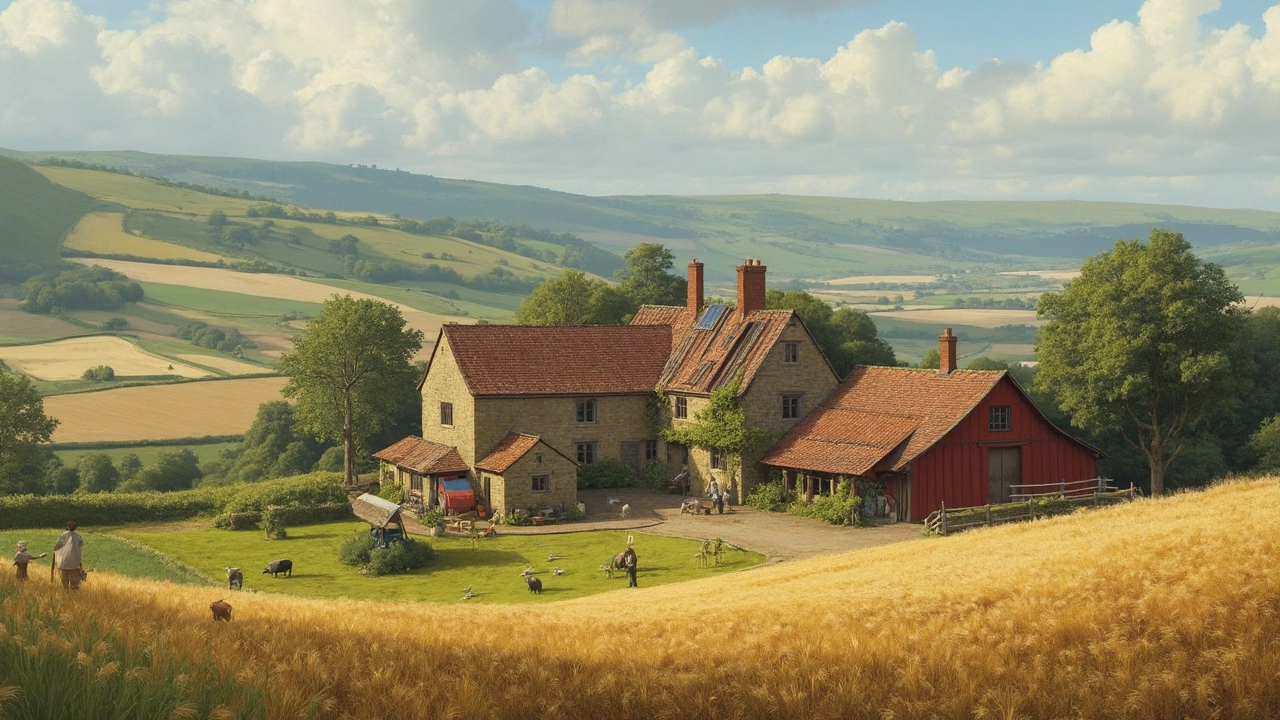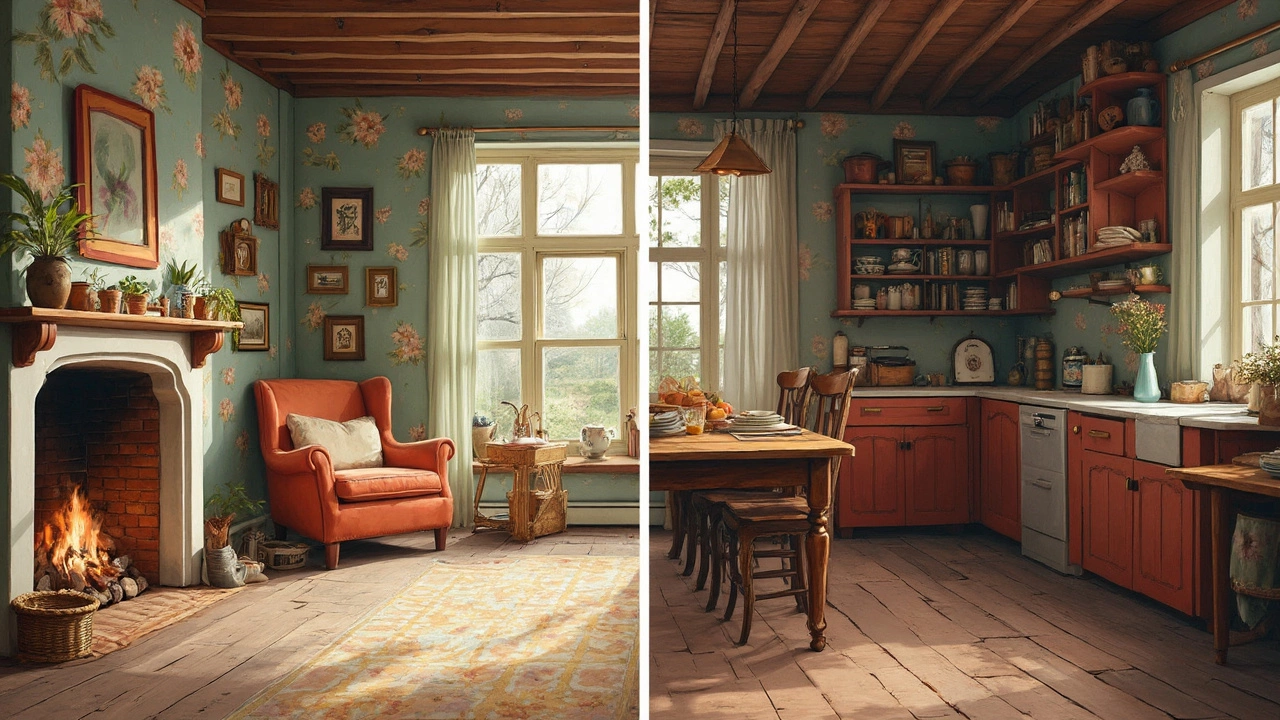So, you're thinking about embracing that rural life, but stuck between a country cottage and a farmhouse? Let's break it down. At first glance, both might seem similar since they bleed rustic charm. But dig a little deeper, and you'll find some notable differences.
A country cottage is all about coziness. They tend to be smaller, full of character, and often nestled into picturesque landscapes. Think stone façades, thatched roofs, maybe even a quaint garden out front. It's the kind of place where you'd want to curl up with a good book.
On the flip side, a farmhouse is generally larger and more functional. They're designed to support farm activities—imagine wide porches, practical layouts, and room for farm equipment. It's a living space that mirrors a way of life centered around agriculture.
- Architecture and Design
- Purpose and Function
- Decorative Styles
- Lifestyle and Features
- Choosing the Right Fit
Architecture and Design
When it comes to architecture, both country cottages and farmhouses have their own flair, though they cater to different needs and aesthetics. A country cottage is often smaller, focusing on charm and coziness. Think charming stone or brick exteriors, low-pitched roofs, and small-paned windows. The design is meant to blend with nature, creating a sense of tranquility and escape from busy city life.
A typical cottage might have an irregular floor plan, which adds character and a homey feel. The rooms in cottages are usually snug, with nooks and crannies adding to the aesthetic charm.
In contrast, the farmhouse is built with practicality in mind. These homes are larger, with an emphasis on functionality to support farm life. Historically, these structures served not just as homes but also as extensions of agricultural land. Common features include wide porches that offer a cooling spot in the shade during hot days and spacious kitchens that become the heart of the household.
Farmhouses typically have simple, rectangular floor plans. This straightforward design maximizes space and makes it easier to move around, especially when managing large families or farm hands. The interiors often feature exposed wood beams and wooden floors, giving a warm but minimalist look.
Both styles share a love for wood as a material, whether in beams, floors, or furniture. However, cottages often bring a more decorative flair with intricate woodwork, while farmhouses prioritize sturdiness and simplicity.
Let's take a glance at a handful of attributes:
- Country Cottage: Small, quaint, irregular floor plans.
- Farmhouse: Large, practical, simple layout.
Purpose and Function
So, what's the real deal with the function of a country cottage versus a farmhouse? Both were born from necessity but evolved quite differently over time.
The Cottage Life
A country cottage primarily serves as a humble abode. Historically, these were homes for rural workers or small landowners who needed a cozy space to live, away from the hustle and bustle of city life. Today, cottages often serve as vacation homes where people escape for a bit of peace and greenery, trading urban chaos for countryside calm.
Farmhouse Functionality
Farmhouses, on the other hand, are all about practicality. Built to support farming activities, these homes usually feature structures like barns or sheds, perfect for storing equipment and produce. They are typically situated in the middle of farmable land, maximizing efficiency for agricultural work.
Key Differences
To sum it up, the main function of a country cottage is more about living comfortably in a scenic setting, while a farmhouse has to juggle between being a family home and a hub for work.
Today's Trends
Nowadays, mixing these influences is pretty popular. Some people add farmhouse elements to cottages, like using reclaimed wood or installing farmhouse sinks. Others might bring some of that cozy vibe into their farmhouses with plush furnishings.
| Feature | Country Cottage | Farmhouse |
|---|---|---|
| Main Use | Residential – Leisure/Escape | Residential and Agricultural |
| Location | Scenic, wooded, or by water | In the middle of farmland |
| Common Elements | Gardens, stonework | Barns, large porches |

Decorative Styles
Now, let's chat about the decorative styles that bring these homes to life. When it comes to a country cottage, think homey and nostalgic. You're likely to find floral patterns, delicate lace curtains, and aged wooden beams adding to the cottage's character. It's about creating a snug, welcoming atmosphere.
Cottage decor often mixes elements like patchwork quilts, vintage rugs, and mismatched furniture to evoke that warm, lived-in look, drawing inspiration from nature with fresh flowers and earthy tones. Love the idea of quirky collections? Add those in too—little porcelain animals or vintage teacups fit right in.
Imagine a fireplace with a wooden mantel adorned with family pictures, or an old kitchen with copper pots hanging above. It's the charm in imperfection that defines the style here.
Farmhouse Vibes
Switching gears to farmhouse decor, you'll notice a blend of function and rustic charm. Farmhouses lean towards a more open, airy feel with practical furniture that can handle the wear and tear of farm life. Think sturdy farmhouse tables, shiplap walls, and exposed beams.
Neutral palettes with splashes of color—like navy or mustard—add depth without overwhelming. Instead of florals, you might see loads of gingham and plaid. Metal and wood are staple materials, and pieces like galvanized troughs or vintage milk jugs could double as decor.
- Lighting: Industrial lights like barn pendants fit right in.
- Floors: Wooden floors with wide planks are typical.
- Textiles: Linen or burlap cushions add texture without fuss.
Both styles share a love for rustic materials and vintage finds but have different vibes. Whether you're all about the quaint charm of a country cottage or the functional elegance of a farmhouse, your choice reflects your lifestyle and personality.
Lifestyle and Features
When it comes to lifestyle and features, a country cottage and a farmhouse offer different experiences. Both are charming in their ways, but what attracts you should match your lifestyle preferences.
Country Cottage Charm
Cottages are all about a laid-back vibe. Imagine mornings in a flower-filled garden or cozy evenings by the fire. The interiors tend to be more intimate, featuring wooden beams, plush furniture, and a mix of floral and vintage decor. This style is perfect if you're drawn to a more relaxed, slow-paced life. Plus, with a smaller size, maintenance tends to be easier and allows for a strong focus on personal decoration.
Farmhouse Practicality
In contrast, farmhouses are all about function and space. These homes were built to accommodate the daily routines of farming life, which means open floor plans and ample outdoor space are typical features. If you're someone who loves the outdoors or needs room for equipment or hobbies, a farmhouse might be your ideal spot. Think large kitchens, expansive dining areas, and a porch where everyone can gather after a long day.
- Farmhouses typically provide more bedrooms and bathrooms, designed for larger families or groups.
- Accessibility to outbuildings like barns or workshops is common, making them ideal for those involved in agricultural or DIY projects.
At the end of the day, deciding between a country cottage and a farmhouse comes down to how you envision your life unfolding in that space. Do you want something intimate and storybook-esque, or do you need big spaces for family and farm life? It's all about what feels right to you.

Choosing the Right Fit
When it comes to settling on a country cottage or a farmhouse, think about what you really need for your lifestyle. It's not just about picking a structure; it's about picking the right vibe that fits your daily routine and long-term goals.
Consider your space needs first. If you're a small family or perhaps an individual wanting that cozy corner to call your own, a country cottage might be perfect. You get warmth, intimacy, and a sense of retreat. It's like a hug from a house.
On the other hand, if you plan to involve yourself in farming activities or need room for family gatherings, a farmhouse provides the practicality and space you need. Farmhouses are built for function—think expansive kitchens, large dining rooms, and enough bedrooms for everyone.
Budgets and Maintenance
Your budget is another big factor. Generally, a country cottage might come with less upfront cost but could require ongoing maintenance due to its age or historic elements. Meanwhile, a farmhouse might cost more initially due to its size and functionality but could require less frequent touches in terms of décor updates.
Maintenance is something you can't ignore. Cottages with thatched roofs and lots of wood need regular care to keep their charm. Farmhouses, often brick or wood-sided, are built to withstand a lot, yet larger areas can mean more effort.
Location and Purpose
Location plays a part too. If escape from city bustle is your goal, you might find a cottage idyllic. They're often tucked into quaint villages or near lush scenery. Farmhouses generally sit on larger plots of land, ideal if you're aiming for some outdoor projects or even a small-scale farm.
- If you want space for gardening, chickens, or even a few sheep, a farmhouse can be your perfect match.
- If you're looking to downsize and simplify, the compact cottage life might suit you better.
Flexibility and Future Plans
Finally, think about the future. Where do you see yourself in five or ten years? Do you think family expansions, needing more space, or preferring to stay minimal? Your future plans should reflect in your decision today.